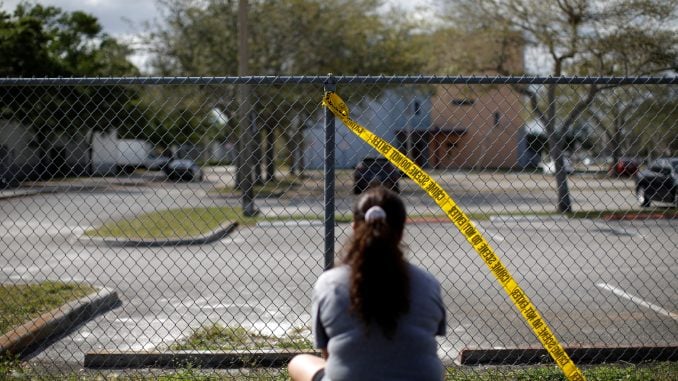
SHELBY – N.C. House Speaker Tim Moore announced Tuesday the formation of a legislative select committee on school safety. The announcement comes in the wake of the Parkland, Florida school shooting last week that left 17 students and teachers dead.
“As parents, our highest priority is keeping our children safe,” said Moore. “It starts with building safer schools in the capital construction phase and maintaining secure education facilities every day across North Carolina. It is our duty to provide the highest level of physical security for our kids’ classrooms through access control, surveillance and training.”
Chaired by Rep. John Torbett (R-Gaston) and Rep. David Lewis (R-Harnett), the committee announced Tuesday will include 41 Republicans and Democrats who will make recommendations to the full N.C. House, which is scheduled to return for the long legislative session on May 16. Rep. Jeffrey Elmore (R-Wilkes), who will serve on the committee, is a public high school teacher.
“You could never be one hundred percent prepared for a situation like that, all you can do is follow what you’ve been trained to do to the best of your ability because these type situations are truly acts of terror,” said Elmore. “But the schools are the most prepared they’ve ever been in my whole career at this moment, but you can always improve on that and a lot of people don’t understand how that process works and what the trainings are about,” said Elmore.
The school training comes from the N.C. Center for Safer Schools, established within the Department of Public Instruction under former Gov. Pat McCrory back in 2013. The Center came as a result of the 2012 Newtown, Conn. shooting where a gunman killed 20 children and six adults at Sandy Hook Elementary School. The lessons learned there, and ones since, contribute to new plans to keep N.C. student safe.
“I will triage this information from Florida when it comes in and see if we can learn anything new, and see if we can apply it to what we are doing here in N.C.,” said Mike Anderson, the Community Development and Training Manager for the Center for Safer Schools.
Anderson is a retired police officer and an expert in school and mass shootings. He’s studied every mass shooting since 1992, pulling together the details from before an event happens, how to best to react during a crisis, and how to help a community come back together in the wake of a violent crime. He and his seven colleagues work every day, thinking about incidents like the one in Florida last week.
“We have a pretty diverse staff over here,” said Anderson. “We all have our specialties and collaborate really well with other state agencies, DHHS and DPS, to make sure everyone is around the table and make sure everyone is on the same page.”
Anderson and his colleagues provide statewide training for teachers and administration on how to identify a student in mental health crisis, bullying intervention and management of critical incidents at school.
“We don’t want to train an adversary, obviously, so we don’t want parents to know all the full plans, but we do want them to understand that we are ahead of the curve when it comes to training in that we do have a uniform protocol statewide to be able to deal with these things,” said Anderson.
Anderson also studies public reaction to a mass shooting crime.
“In all the cases that I’ve studied society usually tries to feel better about it if they can explain it away by hanging some sort of cause of it, usually bullying comes up, violent media, violent video games, substance abuse, gun control,” said Anderson.
“As a society, that’s what we want to hang it on, it makes us feel better, and it makes us feel better when someone is tried and convicted of a crime. As long as we can explain it away, we are fine and unfortunately we sit back and wait for the next one.”
But Anderson says the key to breaking that cycle is studying all the pieces of the puzzle and gaining community buy-in. He said that eighty percent of shooters tell at least one person, and recently mostly on social media.
“The problem is that social media and the internet has become like reality TV to teenagers. They feel like they can’t make a difference, either they don’t trust people or they think that nothing is going to happen if they tell somebody, so they just sit back and watch it unfold.’”
The new bipartisan House Select Committee on School Safety will consult with local governments, school systems and policy experts in a range of fields to address violence prevention, emergency management and security in North Carolina classrooms.
“The staff of the Center for Safer Schools think about school safety every day and have great relationships with our state partners at the Department of Public Safety, the Department of Health and Human Services, and with North Carolina’s school districts and charter schools,” said Superintendent Mark Johnson in a statement. “We look forward to working with the committee to show the progress we have made since the center’s opening in 2013 and where we need to go.”
In the meantime, Anderson says parents and teachers should remind students, if you see something, say something.
“If you’re in a school and you see a person who is not what they were yesterday, or teachers seeing signs of depression… they need to tell somebody. If they are in a hardware store and they see something weird, they need to tell somebody. It’s going to take all of us to get into this mindset that school safety is not something we can just put on the cops anymore,” said Anderson.
“They can’t just sit back and hope someone else is going to say something because they may not.”


